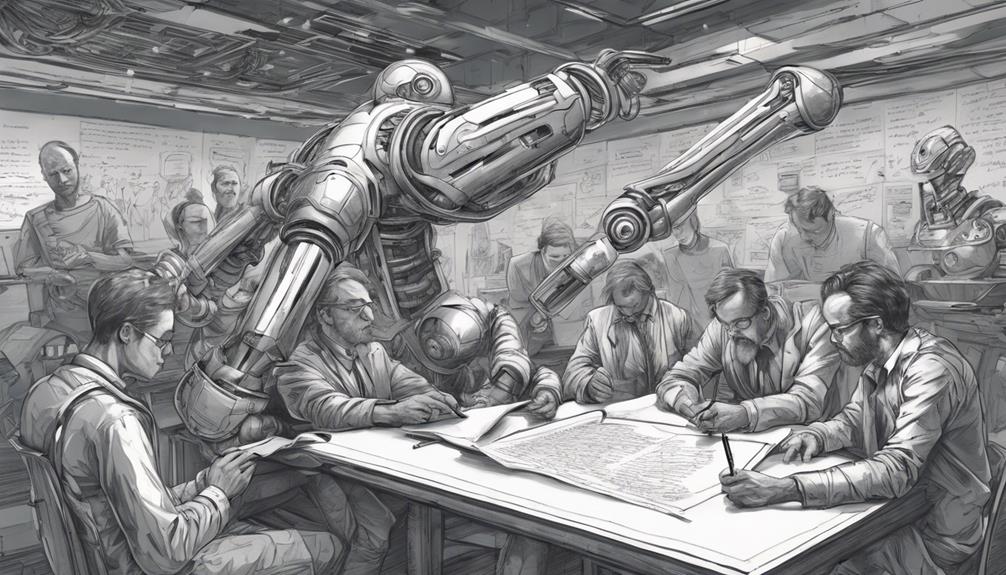As artificial intelligence (AI) becomes increasingly integral in various industries to improve efficiency and streamline processes, a notable transformation is occurring in the labor market. The replacement of human positions with AI is impacting numerous sectors, sparking crucial conversations about the future of work and the evolving role of technology in our professional lives.
From the displacement of traditional roles to the emergence of new opportunities, understanding the intricate interplay between AI and human labor is crucial. In a world where technological advancements continue to reshape industries, exploring the nuances of AI's influence on the job market becomes not just relevant but imperative.
Key Takeaways
- AI algorithms and automation are reshaping industries globally by 2025.
- Roles like customer service reps and research analysts are at risk.
- Automation threatens jobs involving repetitive tasks and data analysis.
- Embracing lifelong learning and AI specialization is crucial for adapting to AI's impact.
Industries Impacted by AI Job Displacement
The impact of AI job displacement is currently reshaping various industries worldwide, with projections indicating significant changes by 2025. AI algorithms and automation are at the forefront of this transformation, with autonomous vehicles playing a pivotal role in replacing certain human jobs. Industries such as healthcare, agriculture, and industrial sectors are experiencing shifts as AI integration becomes more prevalent. Specific roles like customer service representatives, car and truck drivers, computer programmers, research analysts, and paralegals are increasingly at risk of being replaced by AI technologies.
Automation and autonomous vehicles are particularly affecting jobs like customer service representatives and car and truck drivers. The seamless integration of AI in these sectors is leading to potential job displacements as companies seek more efficient and cost-effective solutions. Industries such as finance, banking, healthcare, and customer service departments are witnessing firsthand the impact of AI job displacement, prompting a reevaluation of hiring practices and workforce management strategies to adapt to this evolving landscape.
Jobs Likely to Be Automated

As the integration of AI technologies continues to reshape various industries and displace human jobs, certain roles are increasingly identified as likely candidates for automation. Here are some jobs that are at risk of being automated:
- Customer service representatives: AI chatbots are becoming more efficient at handling inquiries, potentially replacing human workers in this field.
- Receptionists: AI systems can now manage tasks like appointment scheduling and visitor check-ins, making the role of human receptionists dispensable.
- Accountants and bookkeepers: Automated systems powered by AI can streamline financial data analysis and reporting, posing a threat to traditional accounting roles.
- Salespeople: The advancement of AI technology enables automated analysis of customer data and product recommendations without the need for human intervention, putting sales jobs in jeopardy.
As AI technology continues to evolve, these roles involving repetitive tasks and data analysis are likely to be automated, leading to a shift in the job market and the skills required for future employment.
Benefits of AI in Employment
Enhancing workplace efficiency and creating new job roles, AI technology offers a multitude of benefits in the realm of employment. AI not only saves time on tedious tasks but also enhances overall efficiency in the workplace. The development of AI has led to the creation of new roles such as machine learning engineers and AI ethics specialists. While AI has the potential to replace some human jobs, it also redirects human effort towards more productive tasks, creating new job opportunities and transforming existing roles. Human workers remain essential for tasks like training, maintaining, and monitoring AI systems, ensuring a symbiotic relationship between AI technology and human labor. The integration of AI in various industries has resulted in increased productivity and efficiency across different job roles, ultimately leading to higher job satisfaction for employees.
| Benefits of AI in Employment | |
|---|---|
| Saves time on tedious tasks | Creates new job opportunities |
| Enhances workplace efficiency | Transforms existing roles |
| Redirects human effort | Increases productivity |
| Essential for training AI systems | Improves job satisfaction |
| Creates new job roles | Maintains a symbiotic relationship |
Strategies for Adapting to AI

Given the accelerating pace of AI integration in various industries and its impact on the job market, individuals must proactively adopt strategic approaches to adapt to the evolving landscape of automation and artificial intelligence technologies. To effectively navigate this shift, consider the following strategies:
- Embrace lifelong learning and develop soft skills to adapt to AI-driven job market changes.
- Specialize in specific areas and familiarize yourself with AI through everyday technology use.
- Explore AI specializations like the one offered by Nexford University to stay competitive in the evolving job market.
- Stay updated on the latest AI advancements to remain relevant in a job market influenced by automation and AI technologies.
AI integration drives business efficiency, offering valuable insights for decision-making processes and enhancing productivity. By embracing these strategies and continuously updating skills, individuals can better position themselves to thrive in an increasingly automated world.
Future Job Creation With AI
The forthcoming era of AI integration is poised to catalyze a significant shift in the job market landscape, heralding the creation of diverse new employment opportunities. McKinsey Global Institute projects that AI will generate 133 million fresh jobs by 2030. Roles such as AI ethicists, data scientists, and robot coordinators will be at the forefront of this wave, addressing the ethical, analytical, and operational aspects of AI implementation.
Moreover, AI is set to revolutionize traditional job roles by augmenting productivity and fostering the development of innovative job positions. To navigate these changes, companies are actively engaging in reskilling and upskilling programs to equip their workforce with the necessary competencies. The job market will witness a surge in demand for professionals specializing in AI systems maintenance, further underscoring the need for continuous skills enhancement.
Embracing AI not only promises productivity enhancement but also opens avenues for novel career paths, marking a transformative phase in the realm of employment.
Frequently Asked Questions
How Will AI Replace Human Work?
AI's displacement of human work is multifaceted, impacting various professions globally. The shift involves job roles susceptible to automation, necessitating adaptation and upskilling. Understanding the nuances of AI's integration into the workforce is crucial for future readiness.
What Kind of Jobs Is AI Replacing?
AI is replacing roles across various industries, such as customer service, driving, programming, research analysis, and paralegal work. Automation, chatbots, autonomous vehicles, and generative AI tools are transforming these professions, influencing the job landscape significantly.
How Many Jobs Lost Due to Ai?
The impact of AI on job loss is significant, with projections indicating 85 million jobs globally may be replaced by 2025. This shift towards automation could potentially displace 300 million full-time jobs, necessitating career transitions for many.
Will AI Create Jobs or Replace Jobs?
AI will both create and replace jobs. While 85 million jobs may be lost to AI by 2025, new roles like machine learning engineers emerge. Adapting skills for AI-driven professions will be crucial in navigating the evolving job market.
Conclusion
In conclusion, the rise of AI is reshaping various industries, leading to the displacement of human jobs. While 85 million jobs are projected to be replaced globally by 2025, it is crucial to acknowledge the benefits that AI brings to employment.
Strategies for adapting to AI and creating future job opportunities are essential for navigating this shift in the workforce landscape. As technology continues to advance, the role of human workers in training and monitoring AI systems remains vital.
Ava combines her extensive experience in the press industry with a profound understanding of artificial intelligence to deliver news stories that are not only timely but also deeply informed by the technological undercurrents shaping our world. Her keen eye for the societal impacts of AI innovations enables Press Report to provide nuanced coverage of technology-related developments, highlighting their broader implications for readers.










